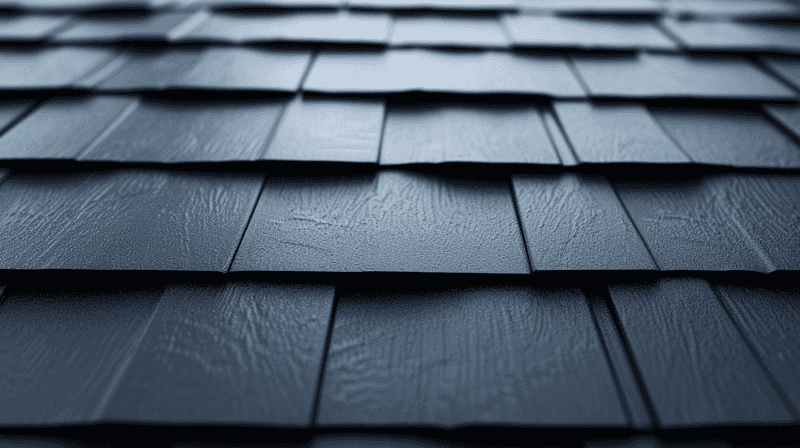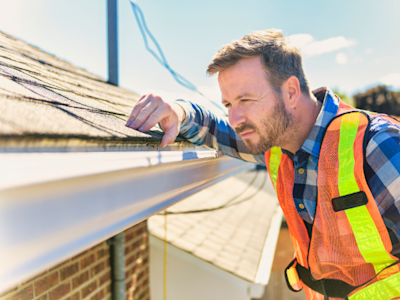A leaking roof doesn't always mean you need a full replacement. When you notice those first worrying signs of water damage, your mind might jump to worst-case scenarios and hefty bills. But for many West Michigan homeowners, roof coating offers a middle-ground solution that can extend your roof's life and stop minor leaks before they become major headaches.
At Roach Home Improvement, we've helped thousands of local homeowners navigate roofing decisions—from simple repairs to complete replacements. We've seen when coatings work wonders and when they simply won't do the job.
In this guide, we'll walk you through what roof coatings can and can't fix, how long they typically last in our Michigan climate, and how to know if coating is right for your situation. No sugar-coating here—just honest advice from your neighbors who've been protecting West Michigan homes for over two decades.
What Is Roof Coating?
Roof coating isn't just paint for your roof—it's a specially formulated protective membrane that's applied as a liquid and cures into a seamless, waterproof barrier. Think of it as a durable raincoat for your roof rather than a cosmetic cover-up.
These coatings are significantly thicker than paint (usually 3-4 times thicker) and contain elastomeric properties that allow them to expand and contract with your roof as temperatures change throughout our Michigan seasons. This flexibility is crucial for maintaining a watertight seal year-round.
Unlike standard paint, quality roof coatings are engineered to withstand harsh UV rays, heavy rain, and temperature extremes. They create a protective shield that reflects sunlight (reducing cooling costs in summer) while providing an additional layer of waterproofing against our notorious Michigan spring rains and winter snow melt.
Types of Roof Coatings
Not all roof coatings are created equal, and choosing the right one depends on your roof type, climate conditions, and specific needs. Here's a breakdown of the main options we see used across Kalamazoo, Battle Creek, and surrounding communities:
Acrylic Coatings
Best for: Sloped roofs with good drainage, moderate climates
Pros: Cost-effective ($1-3 per sq ft), highly reflective, easy to apply
Cons: Not ideal for ponding water, less effective in extreme cold
Silicone Coatings
Best for: Flat roofs prone to ponding water
Pros: Superior waterproofing, UV protection
Cons: Holds dirt, higher cost ($2-4 per sq ft), slippery when wet
Polyurethane Coatings
Best for: High-traffic roofs
Pros: Extremely durable, impact resistant
Cons: Expensive ($3-5 per sq ft), strong odor during installation
Bitumen/Asphalt Coatings
Best for: Built-up roofs, modified bitumen
Pros: Affordable, familiar
Cons: Absorbs heat, shorter lifespan
Elastomeric Coatings
Best for: Various roof types
Pros: Highly flexible, bridges cracks
Cons: Requires proper preparation
| Coating Type | Average Cost | Typical Lifespan | Best Application |
|---|---|---|---|
| Acrylic | $1-3 per sq ft | 5-10 years | Metal, sloped roofs |
| Silicone | $2-4 per sq ft | 10-20 years | Flat roofs, ponding areas |
| Polyurethane | $3-5 per sq ft | 10-15 years | High-traffic, impact resistance |
| Bitumen/Asphalt | $1-2.50 per sq ft | 3-7 years | Built-up roofing systems |
| Elastomeric | $1.50-3.50 per sq ft | 5-15 years | Various roof types |
Common Causes of Roof Leaks
- Aging materials (shingles, metal, membranes)
- Flashing failures around chimneys, skylights
- Missing/damaged shingles from strong winds
- Clogged gutters causing water backup
- Ice dams forming in winter
- Improper installation
- Weak penetration points (vents, pipes)
Not every leak can be fixed with a coating—sometimes direct repair or replacement is needed. Identifying the true source of your problem is the first step toward an effective solution.
Can Roof Coating Stop Leaks?
The short answer: Yes, roof coatings can stop some leaks—but not all of them.
When Roof Coatings Can Help:
- Hairline cracks and small gaps
- Aging but intact surfaces
- Seam issues on metal or membrane roofs
- UV damage prevention
- Minor rust spots on metal roofs
When Coatings Are NOT Enough:
- Structural damage or rotted decking
- Large holes or tears
- Active water infiltration
- Widespread deterioration (25%+ roof damaged)
- Poor drainage or ponding areas
How Long Do Roof Coatings Last?
Lifespan depends on coating material, thickness, surface prep, local climate, slope/drainage, maintenance, and roof traffic.
| Coating Type | Typical Warranty | Realistic Lifespan (Michigan) | Best Fit For |
|---|---|---|---|
| Acrylic | 5-10 years | 5-8 years | Metal roofs, sloped residential |
| Silicone | 10-20 years | 10-15 years | Flat roofs, ponding-prone areas |
| Polyurethane | 10-15 years | 8-12 years | High-traffic commercial roofs |
| Bitumen/Asphalt | 3-7 years | 3-5 years | Budget-conscious repairs |
| Elastomeric | 5-15 years | 5-10 years | Various applications |
Tips to Maximize Lifespan:
- Schedule inspections twice yearly
- Fix ponding water issues
- Keep roof surface clean
- Recoat before failure
- Document coating details
- Use soft-soled shoes for roof access
Roof Coating vs. Roof Replacement
Cost comparison: Replacement costs $4.50-$7.00 per sq ft vs. coating $1.50-$4.50 per sq ft.
When Coating Makes Sense:
- Roof less than 15-20 years old
- Structure sound with minor wear
- Budget constraints, need extra 5-10 years
- Improve energy efficiency
When Replacement Is Smarter:
- Roof near/past expected lifespan
- Multiple leaks across surface
- Structural/rot damage
- Failed past repairs
DIY vs. Professional Application
Why DIY Often Fails:
- Poor surface preparation
- Wrong material selection
- Uneven/thin application
- Safety risks
- Weather misjudgment
- No warranty
Benefits of Professionals:
- Expert inspection and repair
- Access to high-grade materials
- Proper equipment for application
- Warranty coverage
- Time savings
Tips Before Choosing a Roof Coating
- Get a professional inspection
- Verify roof type compatibility
- Consider Michigan weather extremes
- Ask about surface preparation steps
- Review warranty terms
- Request local references/projects
- Get a clear maintenance plan
- Verify contractor insurance/licensing
- Check energy efficiency ratings (SRI)
- Plan application around seasonal weather
Conclusion
Roof coatings can stop minor leaks and extend roof life when applied properly to the right candidate roofs. They're not a cure-all for severe damage, but when combined with honest assessment, proper prep, and professional application, they deliver 5–15 years of added protection. At Roach Home Improvement, we sometimes recommend against coating when it's not the right solution—because protecting your home long-term is always the goal.
Frequently Asked Questions
Will roof coating stop all leaks immediately?
No. It seals small cracks but can’t fix large holes or structural issues. Repairs must be done first.
How often should I re-coat my roof?
Acrylic: every 5–7 years. Silicone: 10–15 years. Always get an inspection every 2–3 years.
Can you apply roof coating over shingles?
Yes, with special products, but results are limited. Works best on sound shingles, not curling/buckling ones.
Does coating lower energy bills?
Reflective coatings can reduce summer cooling costs by 15–30%.
Can coatings void manufacturer warranties?
Yes, if your roof is still under warranty. Always check terms first.
Is roof coating waterproof immediately?
No. Coatings require curing (24 hours–several days depending on product and weather).
How do roof coatings hold up to Michigan winters?
Silicone and polyurethane handle freeze-thaw cycles better than acrylics. Choose products designed for northern climates.
Can I walk on a coated roof?
Yes, but minimize traffic. Some coatings are slippery when wet. Use designated walkways if frequent access is needed.








